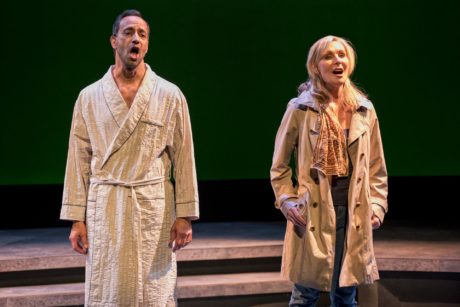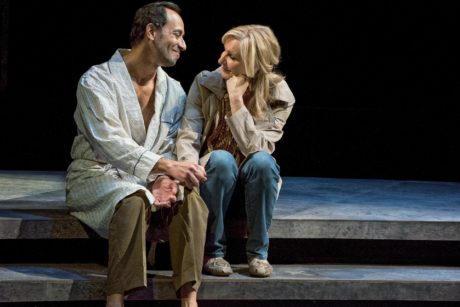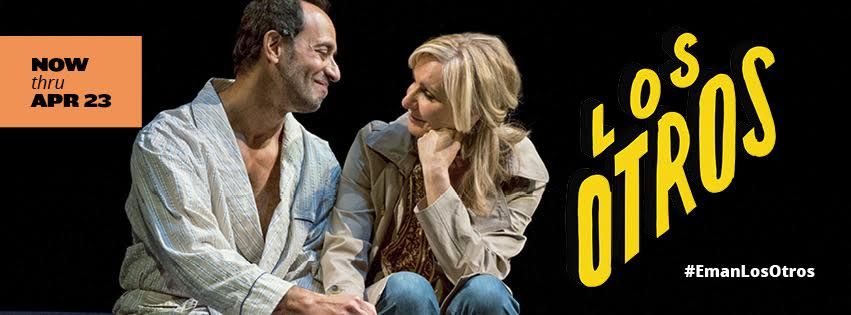It may be more by chance, rather than design, that Everyman Theatre’s production of Los Otros, with book and lyrics by Ellen Fitzhugh and music by Michael John LaChiusa, takes on an urgent sense of relevancy at this moment in American history. Los Otros, after all, translates literally to “the others” and one must only turn to the news to hear any number of pundits and talking heads tear in to debate about the nebulous “other” threatening, or not, to take away our jobs, our safety, or America herself. But this intimate, cerebral two-person musical has its sights focused on exploring the “otherness” of two Californians, Lillian (Judy McLane) and Carlos (Philip Hernández), as a microcosm of the world in which we live.

Los Otros begins in a hospital waiting room in 1995 and weaves in and out of the past and present, memory and fantasy as it works backwards to 1938. Lillian recalls being a child in a town south of San Diego in the early 1950s and being fascinated by an immigrant family that had crossed the Mexican border and were living in a cave. We continue to follow Lillian through several key moments in her life.
Simultaneously, we meet Carlos, first seen taking a shower, as his memory wanders back to his childhood in Mexico and California, to his first job and to spending summers by the sea. Like Lillian, we follow Carlos through several significant moments in his life. The piece reveals itself slowly, like a riddle, and it’s not until more than two thirds of the way through, that we understand how Lillian and Carlos are connected and what brought them together. They actually don’t interact until the last five minutes of show.
In portraying Lillian and Carlos as “the other, Fitzhugh and LaChiusa have sent the characters on opposite trajectories. And this is what gives Los Otros much of its interest. Lillian, a white woman from Southern California, gets married, divorced, becomes a single mother, and makes a very poor life decision. As the decades pass, Lillian transforms from an insider looking out to an outsider looking in. Conversely, Carlos’ journey is the reverse of Lillian’s. When he at last realizes he has lost his “otherness”, he says, “I’m so assimilated that when we go to swap meets, I say ‘look at all these Mexicans’. How did I get here?”
Fitzhugh’s words and LaChiusa’s music are seamlessly integrated. Carlos and Lillian drift in and out of song and, consequently, Los Otros has an ease and fluidity that is appropriate for a piece that hangs dreamily somewhere between then and now. LaChiusa’s score further evidences his status as one of the best musical theatre composers working today. His music reflects not only the cultural aspects of the characters, but the sounds of the different eras where Los Otros unfolds. (The wonderful six-piece band is led by Jon Kalbfleisch) Fitzhugh’s lyrics are witty and she succeeds in using language to create real three dimensional characters, rather than stock types.

Broadway vets McLane and Hernández dive heard first in to this material. McLane journeys from a pre-teen kid to a middle-aged woman whose life is unraveling. Her big, expert voice is a perfect match for LaChiusa’s difficult, varied music. Hernández’ Carlos is at once loose limbed, at another buttoned up. His performance is just the right fit, but does not overwhelm the stage. The open, minimal set design, backed by three large intricately patterned moving panels is by Daniel Ettinger. Nancy Schertler’s soft, lighting design, creeps up on us, elegantly moving through both time and space.
But for all that is so good about Los Otros, I found it dramatically inert. It feels less like a fully realized show, and more like part of a larger story. What do Lillian and Carlos’ individual experiences bring to their relationship with each other? What do they do with that knowledge of each other’s stories as their lives move forward? We never know. We don’t see them acknowledge or speak to each other until the conclusion of the evening. The ending is abrupt and unfulfilling.
Everyman and Director Noah Himmelstein have dedicated significant time and resources to Los Otros. It was workshopped in New York City last Fall and they have assembled an impressive creative team for this heavily revised regional premiere, that was first seen in an earlier form in 2012 at the Mark Taper Forum in Los Angeles. And we are lucky to have artists of such caliber come to Baltimore to create. This commitment to developing new work, and to presenting unconventional theatre to local audiences should be applauded and encouraged. Los Otros is the first musical Everyman has presented since the 2013 opening of their new, impressive space on Fayette Street.
A philosopher once said that, “He who would learn to fly one day, must learn to walk and run and climb and dance.” Los Otros is an interesting stroll, a slow dance, a leap, as Everyman soars in to the future continuing to present, what one can only hope will be, more, unusual and thoughtful, new musical theatre works. Los Otros is a good start.
Running Time: 90 minutes, with no intermission.
Los Otros plays through April 23, 2017, at Everyman Theatre – 315 West Fayette Street, in Baltimore, MD. For tickets, call the box office at (410) 752-2208, or purchase them online.
LINK:
Wendi Winters reviews Los Ostros on DCMetroTheaterArts.





